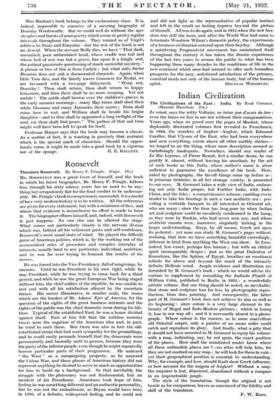Roosevelt
Theodore Roosevelt. By Henry F. Pringle. (Cape. Its.) Ma. ROOSEVELT was a great lover of himself, and the book in which his latest biographer, Mr. Henry F. Pringle, follows him through his sixty uneasy years has no need to be any- thing but scrupulously fair for the final verdict to be unfavour- able. Mr. Pringle's book is conspicuously successful; it is a model of how very modern history is to be written. All the references are given for every statement, but with a minimum of fuss, and where that evidence is inconclusive no effort is made to force it. The biographer effaces himself, and, indeed, with Roosevelt it just happens. No one else can be allowed the stage. What comes out particularly clearly is the nervous ill-ease which was, behind all his vehement gusto and self-confidence, Roosevelt's most usual state of mind. He played the difficult game of American polities, which is, by the working out of the accumulated rules of procedure and complex interplay of interests, usually fatal to any particular, individual, ambition, and he was for ever trying to forecast the results of his
moves.
He was forced into the Vice-Presidency, full of misgivings, by enemies. Until he was President in his own right, while he was President, while he was trying to come back for a third period, and while he saw the great European War being staged without him, the chief soldier of the republic, he was unable to rest and with all his satisfaction alloyed by the uncertain future. His career illuminates, in smaller scale, the issues which are the burden of Mr. Adams' Epic of America, for the question of the rights of the great business interests and the rights of the public was the chief domestic issue during his life- time. Typical of the established East, he was a house divided against itself. Part of him felt that the ruthless monster trusts were the negation of the American idea and, in part, he tried to curb them. But there was also in him the old- established strain that had scant sympathy for the groundlings, and he could easily persuade himself that the democrats were permanently and basically unfit to govern, because they were theparty of the inferior people, even though he might repeatedly borrow particular parts of their programme. He annexed " the West " as a campaigning property, as he annexed the Cuban War, and these phases of American history did not represent anything he desired to serve so much as opportunities for him to build up a background. So that inevitably the struggle with the plutocracy was not fundamental, but an incident of his Presidency. Americans took hope of him, feeling he was something different and an authentic personality, but lie was not the embodiment, as Bryan would have been in 1896, of a definite, widespread feeling, and he could not
and did not fight as the representative of pOpular instinct and left in the result no lasting impress beyond the picture of himself. All was to do again, and in 1912 when the new free- dom was still the issue, and after the World War had come to terminate Woodrow Wilson's domestic policy, the experiments of a business civilization entered upon their heyday. Although a spluttering Progressivist movement has maintained itself throughout the century it has taken the drastic experiences of the last two years to arouse the public to what has been happening these many decades to the conditions of life in the new continent which once had seemed to offer such boundless prospects for the easy, unfettered satisfaction of the primary, essential needs not only of the human body, but of the human




































 Previous page
Previous page